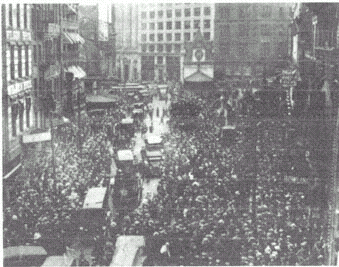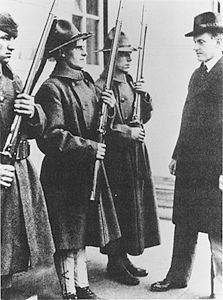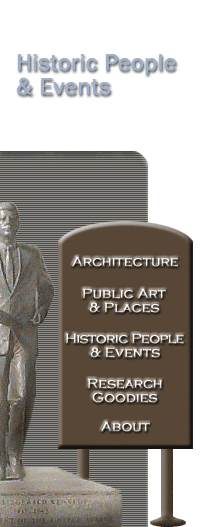 Strikes
and the Red Scare
In 1919 America was still recovering from from the Great World War.
Price inflation and the cost of living had increased far beyond
wages. Men back from the war flooded the labor market which further
diminished workers' earning power.
During this year, one fifth of the country's workers would strike.
The year started with New York's harbor workers striking in January,
followed by dressmakers. In February news headlines reported a "prelude
to revolution" when a general strike in Seattle closed all business
February 6 to 11th.
Bombs were mailed to the mayor of Seattle who broke the strike,
and in April, forty more mail bombs were found en route to other
public leaders for May Day. With the backdrop of apparently spreading
communism, many patriotic Americans believed they were on the verge
of a workers revolution.
In Massachusetts, textile workers in Lawrence walked out in protest
of six day, nine hour work schedules. Boston telephone operators
interrupted much of New England's phone service in an April, and
in July Boston's elevated train workers went off the job in their
own protest. Boston's political and business leaders could see this
national trend of strikes disabling their own businesses and communities,
and they were alarmed.
Police Discontent
There is no doubt that Boston's police had grievances, which they
expressed as early as 1917. New officer pay had not risen in sixty
years, since 1857 when new recruits received two dollars daily.
Officers worked seven days per week, with a day off every other
week during which they couldn't leave town without special permission.
Depending on duty, officers worked between 73 and 98 hours weekly,
and were required to sleep in infested station houses kept in deplorable
condition.
Since 1885, the Boston police were under the command of a commissioner
appointed by the state governor. Though Boston's mayor controlled
their budget, their operation and how they used the budget was controlled
by a commissioner appointed by the governor. This placed the mayor,
Andrew Peters in a difficult position. His city was protected by
a force not in his control. When they would succeed the state took
credit, when there were problems he was closet to them.
There was also an ethnic overlay. Protestants Yankees sought to
control the Irish-Catholic rank and file of the Boston Police Department.
This made the dispute about more than wages or work conditions,
it quickly broke along lines of ethnicity.
By June of 1919 the grievances made by the police had not been addressed.
They turned to the American Federation of Labor to consider unionization.
Police Commissioner Curtis was outspoken in his condemnation of
the movement to unionize.
In August they would be granted a union charter, which Commissioner
Curtis would oppose on the grounds that police were not "an employee,
but a state officer." Mayor Peters was unreachable on an extended
vacation in Maine, but Governor Coolidge and Attorney General Albert
Pillsbury put forward legislation to make unionization illegal for
public employees. Pillsbury would note that the "organized work
man has taken us by the throat and has us at his mercy". The lines
of "us" and "them" were drawn quickly.
Negotiation
From this point on, state officials focused on the legitimacy of
public employees unionizing rather than the validity of the officers
complains. On August 20th commissioner Curtis suspended eight of
the leading police union organizers, followed soon by another ten.
The rank and file were ordered to turn in their nightsticks, and
Curtis began to organize volunteer police substitutes.
When mayor Peters returned from vacation he made conciliatory statements,
and organized a commission headed by prominent banker James Jackson
Storrow. The commission came to the expected conclusion, that though
wages and working conditions required change, it would be inconsistent
with public interest to negotiate with a union, or have the police
obliged to any non-public organization. The majority need for public
safety outweighed the officers asserted right to collective bargaining.
The police were emotionally committed to the union as the only effective
means of making progress. The vote to strike was within five votes
of unanimous, and was seen in Massachusetts as the climax to a year
of violence and threats.
Senator Henry
Cabot Lodge described the strike as "the first step to sovietizing
the country". Governor Coolidge suggested that the city council
raise wages and improve working conditions. Still, Coolidge's commissioner
held firm to his position, and recruited about 200 Harvard athletes
and business men to step in during the expected strike.
Mayor Peters requested that Coolidge dispatch the state guard as
a first reaction to the strike. Coolidge sided with his police commissioner
who advised that volunteers could fill the void, and that troops
should only be sent if needed.
Strike Time

On the evening of September 9th the strike took place as planned.
Nearly three quarters of Boston's police left their jobs. As residents
absorbed the reality of the absence of police, the mischievous among
them took the opportunity to engage in petty crimes. There was gambling
in public, harassing officers: both those on strike who were now
without badge and gun, as well as those who remained as strike breakers
in the greatly weakened force.
By 8pm a crowd estimated at 10,000 gathered, as pictured here, in
Scollay Square. Soon a cigar store window was broken and emptied.
This was followed by a frenzy of looting, gambling and mayhem downtown
and in South Boston until after 1am.
That morning political positioning ensued. Mayor Peters issued a
press release saying he was not to blame, and he called out the
state guard. He used an emergency clause to take control of the
police whenever "tumult, riot, and violent disturbance" happened
within the city. Coolidge reacted by issuing a statement that as
Governor the guard would be under his control, and that Coolidge
not Peters would save Boston.
The President of Harvard, Lawrence Lowell called on more students
to volunteer, as did Boston's businessmen. Crowds waited outside
police stations to attack the volunteers. Cries were heard of "kill
the cops". The Commander of Station 6 in South Boston kept his Harvard
volunteers in the station to protect their lives.
At Scollay Square there were sporadic confrontations between the
replacement police and crowd, resulting in several Harvard students
being cornered. When the first troop of cavalry arrived they had
to intervene to rescue groups of cornered police. Several guardsmen
were injured by thrown rocks, but eventually the threat of live
ammunition and horsemen with swords pushed the crowd from Scollay
Square.
Boston a hive of military activity. At the old armory near the Park
Plaza hotel mobile units with machine guns set up headquarters.
The guard forces kill five residents, while three more would by
killed by civilians. Over twenty people sustained serious wounds.
 The
nation reacts The
nation reacts
The next morning the LA Times wrote "...no man's house, no man's
wife, no man's children will be safe if the police force in unionized
and made subject to the orders of Red Unionite bosses."
Mayor Peters feared that a general strike such as the one which
closed Seattle would follow with the support of other unions and
public employees. With order restored, he met with union leaders
to seek compromise. Governor Coolidge could afford to take a firmer
stance, as ultimately he would not have to lead the city through
a general strike. Further he had a supporter, "Diamond" Jim Timilty
sitting inside the Central Labor Organization who secretly promised
a general strike would not be made.
When the Police Union asked that the officers be reinstated so they
could protect the city while a new contract was negotiated, Coolidge
rebuffed by refusing and stating "there is no right to strike against
the public safety by anybody, anywhere, any time."
Labor was plentiful, by mid-December Commissioner Curtis had hired
an entirely new police force at increased wages and with better
working conditions. The state guard was was able to return to their
homes, and no striking officer returned to the Boston police force.
Governor Coolidge was easily reelected on November 4th, 1919. A
year later he would become Vice-President of the United States,
and following the death of President Warren Harding he became President
on August 2, 1923. Mayor Peters would be defeated in his next election
by his political rival James Michael Curley, who had preceded him
as Mayor.
|



